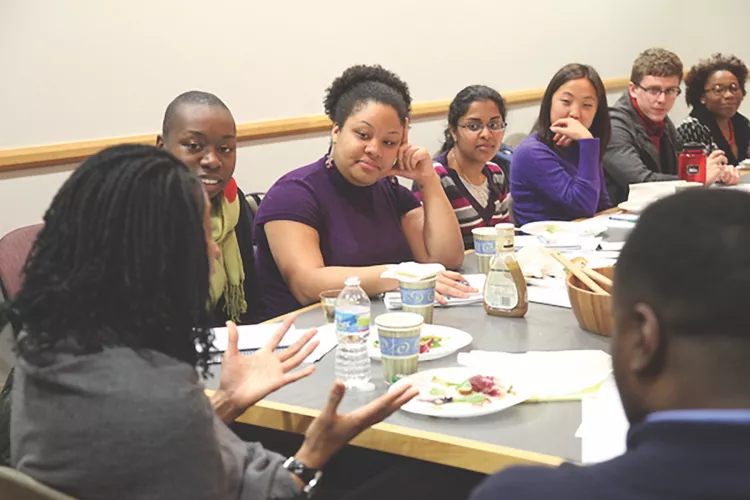Swarthmore’s Honors Program is unique in two ways: its focus on deep collaboration between students and faculty, and its exams given by outside experts. Students think through ideas together in seminars and pursue a wide range of special projects. At the end of their senior year, honors students take written and oral exams with those experts who independently evaluate their work. One alum describes oral exams this way: “I had the feeling that the broader academic community beyond our professors was reaching out with open arms, welcoming and inviting our participation as colleagues in that community.”
Honors students take on a variety of subjects and projects, and tend to be among the most actively engaged students on campus. The program attracts students from all fields, from ancient history to engineering, psychology to peace and conflict studies, dance to physics. In consultation with faculty, students tailor their honors programs to their individual needs and interests. Programs include at least two disciplines, and they often combine courses, seminars, and research. Students may also incorporate creative and community-based projects, whether it’s exploring challenges of the urban underclass in Philadelphia or creating and performing an original play with professional theater artists. And with a little planning, honors students can still spend a semester or two abroad.

“The Honors Program distinguishes Swarthmore from its peers and earns the annual acclaim of external examiners. Students feel exhilarated by the opportunity to engage in such rigorous work, and they rise to the challenge. Year after year, it is a pleasure to see what they achieve.” — Grace Ledbetter, Professor of Classics and Philosophy
HIGH STANDARDS, INTENSIVE SUPPORT
Faculty members act as coaches who aim to bring out the best in each student. Whether it involves producing a paper, a performance, a thesis, or original research, honors work is a laboratory for refining and testing your own ideas, in collaboration with others. Students push themselves to their limits, and faculty members help them every step of the way.
“We want our students to shine in their honors exams; we take great pride in them and do all we can to bring out their potential,” says Jennifer Peck ’06, assistant professor of economics and environmental studies.
BUILDING CONFIDENCE IN YOUR OWN IDEAS
Seminars provide a space where students engage deeply with the material, bringing their own insights and ideas to class. Students support one another as they learn to take intellectual risks. After the exams, there is a palpable transformation in the student, who leaves with new confidence and contacts—and a common refrain from examiners: “My second-year graduate students can’t do that.” Adds one alumna: “By far, my favorite thing is that I get to hang out with cool people and talk about interesting things. It’s invigorating to study with such engaged and excited people.” More than 100 outside examiners travel to Swarthmore each spring, whether they come from the University of Geneva in Switzerland, Harvard University, or the Wilma Theater in nearby Philadelphia. This eclectic group meets one-on-one with students for oral examinations, giving them a chance to test their ideas and exchange perspectives with the very scholars, entrepreneurs, and artists they have been studying.
The intellectual risk-taking, self-direction, and originality honed through the Honors Program carry through to the future achievements of Swarthmore alumni. “As a first-generation college student, the experience of academic research and high-level exams was entirely foreign to me until I did this program,” says one recent alum. “I have found it immensely valuable in preparing me for the type of work and the expectations I have met with in graduate school.”
Honors Callout
“By far, my favorite thing is that I get to hang out with cool people and talk about interesting things. It’s invigorating to study with such engaged and excited people.”




